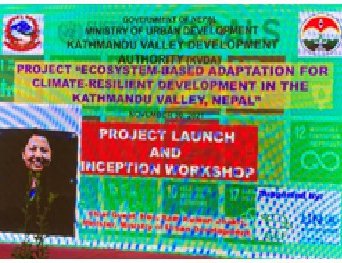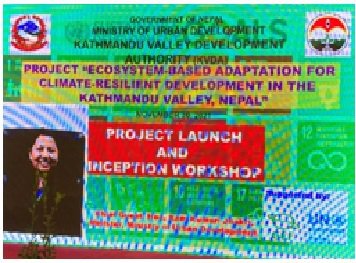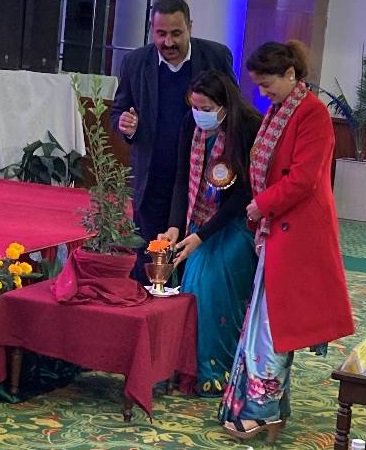
Inaugurating the launch event of the Ecosystem-based Adaptation (EbA) for Climate-Resilient Development in the Kathmandu Valley (urban EbA project), Hon'ble Minister for Urban Development Ms. Ram Kumari Jhakri urged to implement activities with conceptual clarity, ex-ante consideration of implications, knowledge, learning, and confidence. She informed that some policies and strategies are not implemented as they contain several 'words' as heard with no or low understanding of implications. Hon'ble Minister urged to implement policies, standards, and norms to know 'what works and what does not. She gave a clear message that EbA is sufficiently linked to urban development planning and implementation, and it is necessary to prove that 'city can be made better' in our lifetime; what we need to do to make 'new Kathmandu' a lively, environmentally clean, safe and climate-resilient in the next 30 years.

Hon'ble Minister clearly put forward to make the city a 'centre for providing services and producing products' rather than to continue as 'product consumer'. She urged to change the concept and make every effort to link development with people, and clearly understand the national circumstances, develop skills, utilise knowledge, experiences, and learnings, and translate our national and international commitments, including CoP26 to UNFCCC, into actions. In a nutshell, Nepal's policies are considered 'best' but difficult to implement and revisions are proposed along with the change in the political or administrative leadership before their implementation.
Dr. Sunil Babu Shrestha, Vice-Chancellor, Nepal Academy of Science and Technology expected for successful implementation of the project to greatly contribute to integrating climate change adaptation into urban planning and promote the development of climate-resilient cities. Mr. Subarna Shrestha, Mayor, Shankharapur Municipality highlighted the adverse impacts of climate change and urged to effectively implement the project activities.
From the chair, Ms. Januka Dhakal, Development Commissioner of the Kathmandu Valley Development Authority (KVDA) informed her commitment to successfully implement the project activities in close coordination, and collaboration with the concerned agencies. Welcoming the guests and participants, Mr. Narayan P. Bhandari, Deputy Development Commissioner and National Project Director, KVDA considered possible contributions of the project activities to advance climate-resilient infrastructure development in the Valley.
Sharing contributions of EbA in making cities climate-resilient, Ms. Jessica Troni, Adaptation Portfolio Manager, Ecosystem Division at UNEP, Nairobi reiterated the key aspects of the Global Environment Facility (GEF) requiring compliance and role of GEF Implementing Agency in implementing the defined Project activities. Ar. B.B. Khokhali, National Project Manager shared project outcomes and activities and informed delays in project implementation as launching event was possible after nearly two years of fund approval. Non-presence of the Mayor of the Lalitpur Metropolitan City, Secretary of the Ministry of Forests and Soil Conservation, and Dean of the Institute of Engineering, as they were scheduled to make statements in the launch event, calls for making additional efforts for ensuring multi-stakeholders participation during the project implementation.
This Urban EbA project was conceptualized in 2014 to access funding from the Least Developed Countries Fund (LDCF) which is administered by GEFto integrate EbA options into urban planning and implementation. Nepal requested UNEP to function as the GEF Implementing Agency to develop this Project, and Project was cleared by the GEF Council in 2019. The Project is designed to 'build the resilience of local communities in the Kathmandu Valley to the increasing impacts of climate change such as flooding, landslides and drought'. The project is expected to: (i) mainstream EbA into urban development planning; (ii) raise and/or enhance knowledge and awareness on EbA, and (iii) implement EbA options to make climate-vulnerable communities climate-resilient (https://www.spotlightnepal.com/2021/08 /09/advancing-eba-options-nepal/).

Many countries have experienced the adverse effects of natural and human-induced and/or climate-induced disasters more pronouncedly in recent years. The 2021 heavy spots of rain at beginning of the monsoon season and unseasonal rains in October which brought floods and landslides have claimed lives, left a number of people injured, and lost properties by washing away houses, productive lands and infrastructures, mainly hydropower projects and roads, including severe effects to Melamchi Drinking Water Project. The situation is likely to increase in the coming years due to increased climate crisis and 'implementation of unsustainable development path in Nepal.
The importance of 'greens' has repeatedly been highlighted at different levels(https://www.spotlight nepal.com/2021/08/27/communicating-ecosystem-based-adaptation/). Survival of the life-forms including human beings depends upon forests and ecosystem services. Voices of the 'nature-based solutions' and/or EbA advocates are slowly heard. People showed unwillingness a decade ago for building the adaptive capacity of the climate-vulnerable communities, and forests & rangeland ecosystems through EbA. The benefits of low-cost vegetative options have been greatly realized in recent years and hence, EbA would play a significant role in making the engineering solutions long-lasting and climate-resilient by linking with biological treatments.
Presentation on the highlight of the project activities and outcomes in the project launching event, mostly attended by engineers and architects, has generated awareness and enhanced understanding of a group of community on the importance of EbA in making the target areas of the Kathmandu Valley green and climate-resilient and urgency of integrating EbA into the urban planning process. Experience, knowledge generated, and learning of this project would help to expand EbA programs in other municipalities in Nepal. There are multiple approaches to capture this opportunity to make our cities and towns environment-friendly, green, and healthy by addressing climate change impacts. However, it requires a greater understanding of the subject matter and coordination processes to achieve desired outcomes.
Some of the participants attending the event have provided thoughts in making the social and environmental safeguards project-specific to help implement location-specific project activities. Linking the studies related to disaster, watershed, environment, forests, stakeholders, and gender with project sites and activities would value to make the project outcomes useful. As EbA is new to institutions working in infrastructures such as roads, buildings, etc, it is high time to help understand and benefit to the larger section of the urban dwellers from this type of climate change adaptation option.
Opportunities do not come repeatedly. Institutions engaged in advancing EbA in urban planning and implementation, including local governments should come towards effective collaborations and partnerships. Climate change activities demand transparency and valuing multi-stakeholder concerns for the effective implementation of adaptation options at hand. As urban EbA is a new initiative, this project could respond to the urgency of making the cities and towns climate-resilient, and livable by building the adaptive capacity of climate-vulnerable communities and resources.

Batu Uprety
Former Joint-Secretary and Chief of Climate Change Management Division, Ministry of Environment (then), and former Team Leader, National Adaptation Plan (NAP) formulation process. E-mail: upretybk@gmail.com
- Approval Of EIA-Related First And Last Reports At Once
- Jun 14, 2025
- Two Calls For Climate Action From Kathmandu
- May 21, 2025
- Teaming up Climate Change Negotiation
- Apr 18, 2025
- Sagarmatha Sambad: Likely Bearing the Fruits
- Mar 27, 2025
- Decadal Experience In Preparing The NDC
- Mar 03, 2025












